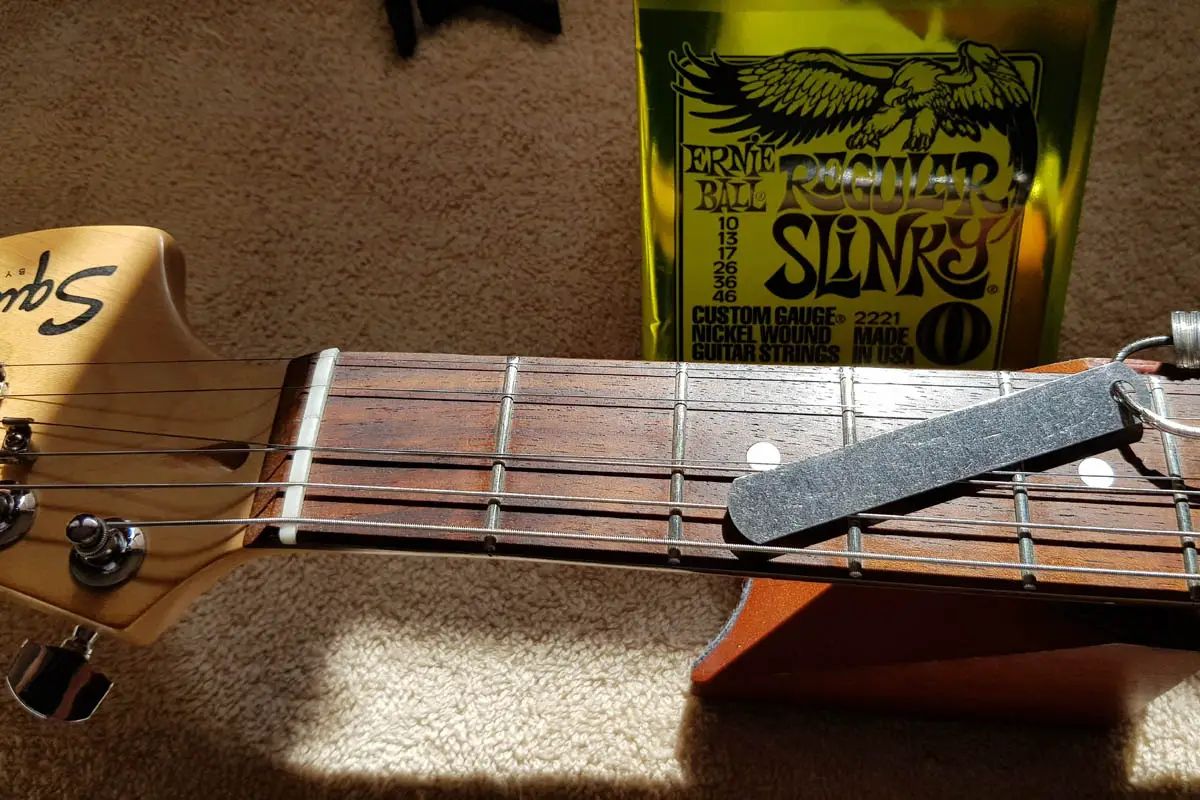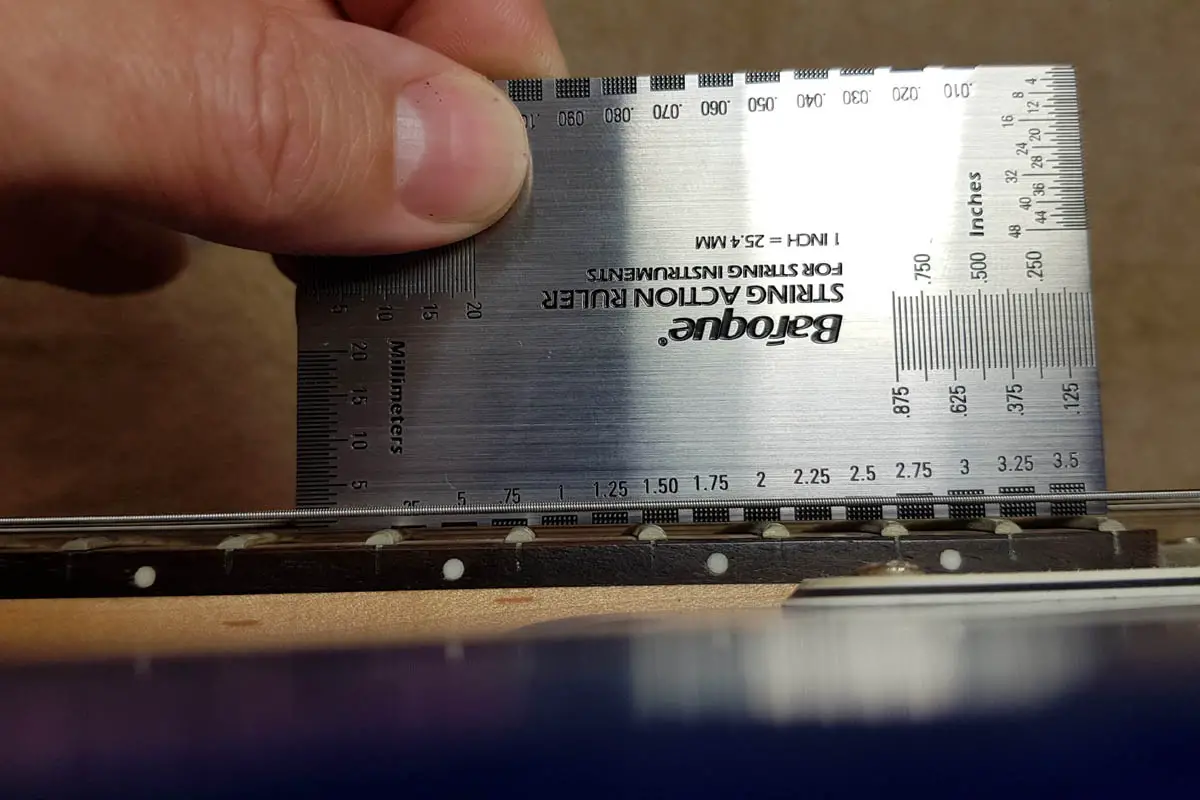How Much Fret Buzz is Normal And When is It a Problem?
Every electric guitar and the guitarist playing it are different, and low action guitar setups combined with some playing styles can result in fret buzz.
The question is how much fret buzz is normal before it becomes unacceptable, and how do you know if it is causing a problem to your sound?
Having a guitar with a low setup is desired by most players, but this sometimes comes with a level of buzz which can be distracting during playing, or even kill the attack of your notes.
An acceptable normal amount of fret buzz on an electric guitar is when it cannot be heard through your amp, and on an acoustic guitar should not be enough to dominate your sound.

How Much Fret Buzz is Considered Normal?
If your guitar is set with a medium to high action and still has fret buzz when playing softly, then it’s not normal to have fret buzz under these conditions and you should look for the cause.
However, if your action is set quite low it is normal for most guitars to get at least a little fret buzz, especially on the initial attack of the note when you first strike the string.
A normal amount of fret buzz is hearing a small amount of buzz across most frets, with the buzzing only on the attack of the note, and the buzzing stops as the note rings out.
If buzzing continues as the string rings out and kills the sustain, then this is not normal fret buzz, and means you should take action to reduce the buzzing.
Fret buzz is acceptable when you still enjoy the sound your guitar makes. There is no rule that says your guitar should have zero buzz and low action strings at the same time.
Fret Buzz on Unplugged Electric Guitars
If you are playing your electric guitar unplugged, it’s more likely that you will hear fret buzz than if you are playing amplified.
This often happens because you naturally strike the strings harder when unplugged to hear the sound of your guitar. When you play plugged-in you can simply turn up the volume control instead of striking the strings harder to get more volume.
Many well set up electric guitars still have a small amount of fret buzz when picking the strings a bit harder, it’s just heard more clearly when unplugged.
If you are tuning up a brand new set of strings, chances are you start the process unplugged, and new strings are known to buzz a bit more until they are played in.
Should Fret Buzz Come Through the Amp?
If your guitar has a normal amount of fret buzz, then in the majority of cases you won’t hear it through your amplifier.
Many speed metal players have action so low that the fret buzz is easy to hear unplugged, but once plugged in the buzz is not audible at a level that takes away sound quality.
In fact, some players like a small amount of fret buzz coming through their sound, saying it creates extra depth to their tone.
When Does Fret Buzz Become a Problem?
Fret buzz starts to cause problems when it affects your sound to the degree where you are not happy with the sound.
Yes, to some degree the acceptable level of fret buzz is up to your personal taste, and for some players that means having no fret buzz at all.
Fret buzz really starts to be a problem when it’s clearly heard through your amp, or is affecting the way you play.
If you are getting a reasonably clean sound on most frets, and then more extreme buzzing on just a few places on the neck, this will indicate that your guitar needs some work done by a tech.
Fret buzz can also be a problem on guitars with low action and a lower radius neck. You can find in this situation that string bending causes notes to buzz and fret out, killing the note completely.

This is a known issue on traditional Strats, and is a reason why guitars with flatter fretboards are preferred for fast playing.
Common Causes of Fret Buzz
There are quite a few reasons why you could get fret buzz, and I’ll list some of them in a brief form here:
- If you are getting fret buzz all over the neck then chances are your action is set too low at the bridge.
- For fret buzz starting around the middle of the neck you may find that the neck profile is too flat, or possibly back-bowed.
- For fret buzz on open strings the normal cause is nut slots being too deep, causing buzz on the first fret.
- For fret buzz on just a few frets, you could find wear on frets close by, or frets that have lifted slightly from the neck creating high points.
- When new strings are first fitted you can extra buzz until they are played in. Also if you have changed to lighter gauge strings, or a different brand you could be hearing extra buzz.
- Electric guitars with bolt-on necks can sometimes get a slight hump in frets above the joint if there are shims underneath, and may cause fret buzz at this one place.
- Budget electric guitars with bolt-on necks can sometimes have a neck misalignment, meaning the strings are at an angle across the fretboard. If the action is lowered too much, string buzz can occur in some regions of the neck.
What Should I Do if My Guitar is Buzzing Too Much?
If your guitar is buzzing too much for your liking, then the first thing to do is find the cause of the problem, and in many cases you can resolve it quite easily.
We have a guide talking all about fret buzz and how to fix it. Check it out.
1. Fret Buzz Due to Setup Changes
Buzzing that has recently occured could be due to a change in the setup you have made yourself, a change of environment, or even damage to your guitar.
When the buzzing has started due to a change you (or your guitar tech) have made, then it’s just a matter of reversing the changes, and often just a small change will reduce most of the buzz.
If it’s extremely low action you are after, then you may need to consider if your guitar is designed for that action, and if your playstyle is too heavy and creating some of the buzz.
Often it just means compromising your ideals a little, and having the action slightly higher, and you may be surprised to know that many professional players have a higher action than you think.
When you’ve just made a change to a lighter set of strings and are getting buzz, make sure to adjust the neck relief for the new string tension.
2. Fret Buzz Due to Environmental Changes
Wood is great at absorbing or losing moisture to match the current weather conditions, and you could find that your truss rod simply needs a small adjustment to fix the buzz.
3. Fret Buzz Due to String Changes
Especially when moving to lighter gauge strings, the truss rod could be set with too much tension, making the neck profile too flat or slightly back-bowed.
This can also happen with a different brand of string in the same gauge, as they may have a different core construction. This requires a small adjustment to the truss rod to correct the neck relief.
4. Fret Buzz Due to Other Problems
When you’re getting fret buzz that can’t be easily fixed with changes to the action, or a truss rod adjustment, then you could need a guitar technician to look at your guitar.
This doesn’t mean you can’t fix some of these problems yourself if you’re handy, but for most players it’s best to get the opinion of an experienced luthier before deciding how to fix the problem.
Conclusion
As long as fret buzz isn’t killing your sound or dominating the sound through your amp, then it could be considered to be normal.
Like most things musical, fret buzz can be subjective, and what one person finds normal can be extremely annoying and frustrating to another.
If you have some fret buzz with your guitar setup but are getting a sound that you are happy with, then the buzz is nothing to worry about unless it becomes worse over time.
For more extreme fret buzz you may be able to reduce it by changing the action on your guitar, or otherwise there could be some problems needing some professional work done to resolve the buzz.



